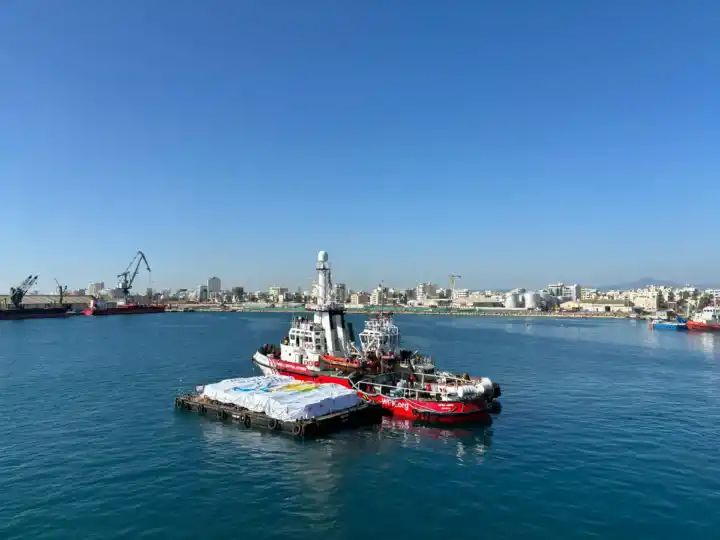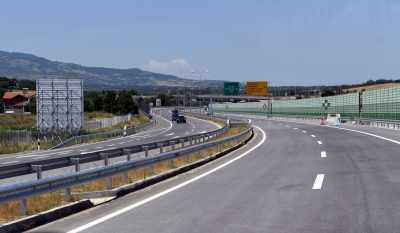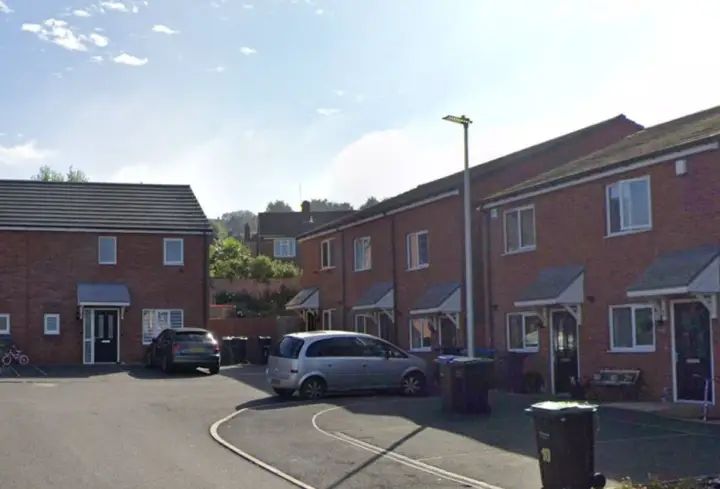First Gaza aid ship leaves from Cyprus carrying 200 tonnes of food

The first boat of humanitarian aid for Gaza has set off from Cyprus carrying 200 tonnes of food, a test run hoping to open up a sea route to bring vital supplies to the besieged strip.
The pilot voyage was mostly funded by the United Arab Emirates, coordinated by the Cypriot authorities and organised by Spanish charity Open Arms together with World Central Kitchen, an American NGO led by Michelin-starred chef Jose Andres.
WCK already operates 60 community kitchens feeding people inside Gaza, where the UN says a quarter of the population is one step from famine under Israeli bombardment and blockade.
The NGO said the vessel was packed with rice, flour, proteins, legumes and canned vegetables. They say they have a further 500 tonnes of supplies in Cyprus and are “working to send as many aid boats as possible”.
“Our goal is to establish a maritime highway of boats and barges stocked with millions of meals continuously headed towards Gaza,” said Mr Andres and chief executive officer Erin Gore in a statement. WCK is currently building a jetty from destroyed rubble to receive the aid in the centre of Gaza.
The project – which was announced by European Commission head Ursula Von Der Leyen last week – is part of several initiatives to try to alleviate what UN officials have described as an “unprecedented” humanitarian catastrophe in Gaza where hundreds of thousands of people are now starving.
“The first ship in the context of the Cyprus Maritime Corridor Initiative for humanitarian aid to Gaza has sailed. It is a lifeline to civilians,” Cypriot president Nikos Christodoulides said on X, formerly known as Twitter. Ursula Von der Leyen thanked the Cypriot president “for Cyprus’ leadership in setting up the humanitarian maritime corridor to Gaza.”
“The departure of the first ship is a sign of hope. We will work hard together for many more ships to follow. We will do everything in our power for aid to reach Palestinians,” she added on X.
US president Joe Biden has announced a separate project to build a temporary floating pier in Gaza, designed to receive large ships bringing aid, although he did not indicate where the location would be.
Pentagon spokesperson Air Force Major General Patrick Ryder said planning was still in the early stages and would take “likely up to 60 days” to complete, involving some 1,000 troops, though none would be deployed ashore. Over the weekend a US army vessel set sail for the Mediterranean to start construction.
Israel has launched its heaviest ever bombardment of Gaza and imposed a crippling siege in retaliation for the Hamas militant group’s bloody attacks on southern Israel on 7 October, which killed more than 1,200 people and saw 240 hostages taken, including children.
More than 30,000 Palestinians have been killed since Israel launched its ground offensive into Gaza in late October, the vast majority of them women and children, according to Palestinian health officials in the Hamas-run strip. At least 60 per cent of Gaza’s homes and buildings have reportedly been destroyed or damaged, and more than three quarters of the 2.2 million-strong population are displaced.
Now UN officials warn the population is facing death from hunger and disease as well as the bombings – particularly for the 300,000 people who remain in the northern part of the 42km-long enclave, where little to no aid is getting through.
There the World Health Organisation told The Independent that food, hygiene and clean water shortages mean a sixth of children under two are now acutely malnourished. Palestinian health ministry officials told The Independent at least 25 people have died from malnutrition and dehydration.
COGAT, Israel’s defence ministry unit tasked with coordinating with the Palestinians, has denied strangling aid to Gaza in statements to The Independent. It has said on its social media accounts that there “is no limit to the amount of aid that can enter Gaza”.
However UN agencies, aid organisations and both international and Palestinian medics on the ground have told The Independent that the closure of multiple land crossings from Israel to Gaza, the restrictions on aid from the crossings which are open to Egypt, as well as difficulty of movement and Israeli restrictions within Gaza, means there is only a trickle of aid getting through.
The chokehold on land access to civilians in the north of Gaza in particular has led to countries and organisations relying on “last resort” methods of delivering aid including via air drops, which can be ineffective, expensive and dangerous.
The sea route is another tack. The Independent understands that Israel is checking the shipments in Cyprus, before they arrive in Gaza.
Watch live: First boat carrying aid for Gaza leaves Cyprus port





